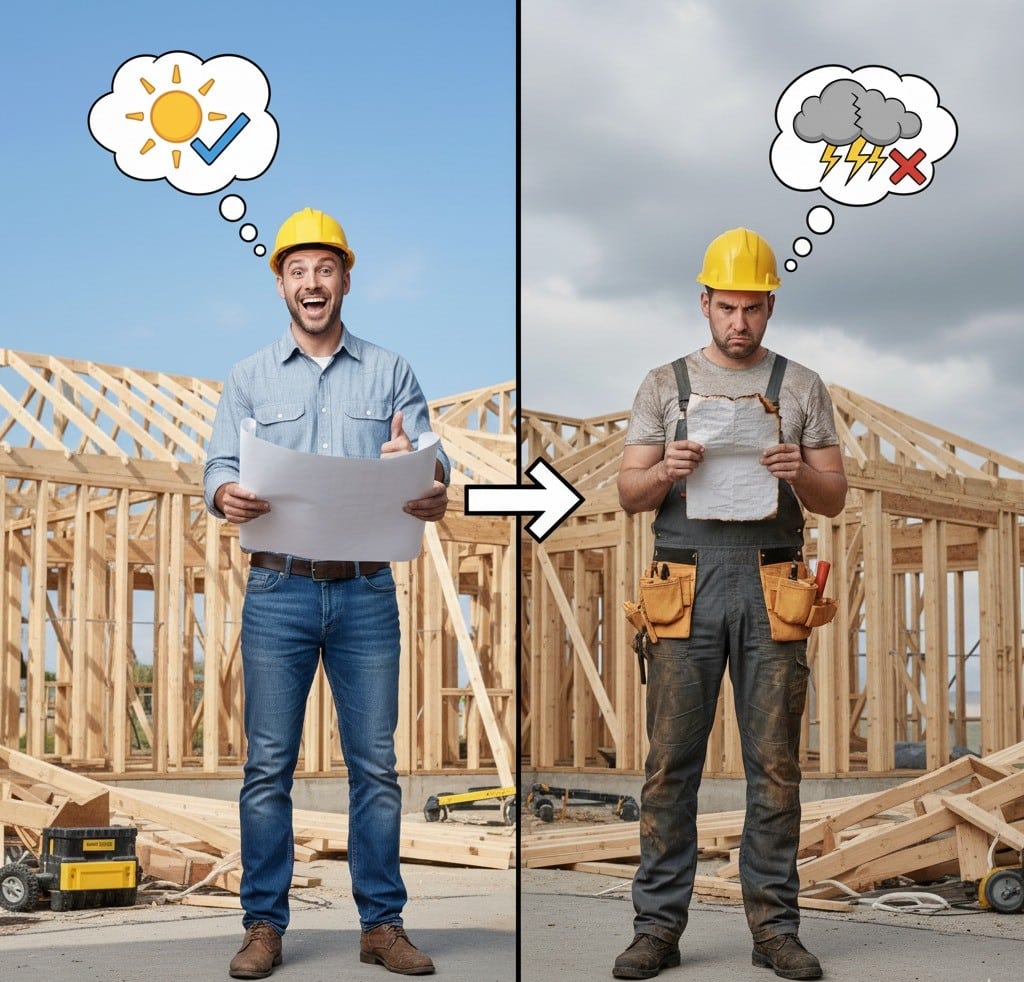Table of Contents
I recently helped a North Atlanta family recover from a basement renovation disaster. They hired what seemed like a legitimate basement contractor for their basement makeover. Three months later? Moisture barriers installed backwards. Electrical work that failed inspection twice. An unlicensed worker who created serious safety hazards.
The basement remodeler vanished, leaving them with thousands in damage repairs.
This wasn’t some fly-by-night operation. The guy had a professional website, good reviews on Google, even showed them photos of “his work.” Turns out those photos were stolen from legitimate basement finishing contractors. His license had been suspended months earlier.
As a licensed contractor who specializes in basement renovations, basement conversions, and basement transformations across Cherokee County and North Fulton, I’ve seen variations of this nightmare play out repeatedly. But here’s what kills me: every single disaster could have been prevented with the right questions.
Not generic contractor questions you find on home improvement blogs. Specific, basement-focused questions that expose the frauds, reveal technical incompetence, and protect your family from financial devastation.
Why Generic Contractor Advice Fails North Atlanta Homeowners
Most contractor checklists are written by content writers who’ve never held a contractor’s license. They miss the nuanced differences between general remodeling and basement-specific work. They don’t understand Cherokee County versus North Fulton permit variations. They’ve never dealt with North Atlanta’s clay soil moisture nightmares.
Here’s what actually matters: Basement finishing isn’t just remodeling, it’s specialized below-grade construction that requires specific expertise with moisture control, soil conditions, and humidity management unique to our region.
Whether you’re planning a basement conversion into a family room, creating a basement apartment, or doing a complete basement makeover, the wrong contractor doesn’t just deliver poor quality. They create long-term structural problems that cost tens of thousands to fix properly.
If you’re also weighing bids, use this guide to compare contractor quotes on basement remodels.
The 5-Phase Contractor Vetting System That Actually Works
This system comes from 22 years of working with homeowners who either chose well or learned expensive lessons. The homeowners who avoided disasters followed this exact sequence.
Phase 1: Red Flag Elimination (Before Meeting Anyone)
These warning signs disqualify contractors immediately. No exceptions.
Immediate Disqualifiers:
- No Georgia contractor license or expired licensing
- Post office box addresses or cell phone-only contact
- Door-to-door solicitation or unsolicited contact
- Requests for 50% or more upfront payment
- Can’t provide recent basement finishing photos, basement renovation portfolios, or basement conversion examples from North Atlanta
I learned this early in my career. A family whose “contractor” demanded substantial money upfront to “buy materials.” The check cleared on Friday. By Monday, his phone was disconnected.
Quick Verification Step:
Visit sos.ga.gov and enter their contractor license number. Takes 30 seconds. No valid license? End the conversation immediately.
Phase 2: Technical Competency Testing
Generic contractors can install flooring or paint walls. Basement specialists understand below-grade environmental challenges that will destroy your basement renovation investment if handled incorrectly.
Whether you’re planning a basement transformation into a rec room, basement conversion to a family room, or basement buildout for a basement apartment, technical expertise matters.
The Clay Soil Knowledge Test
Ask this exact question: “How does Cherokee County’s clay soil specifically impact basement waterproofing and moisture control differently from sandy soils, and what basement insulation techniques do you recommend?”
What you should hear: Technical discussion about expansive clay, hydrostatic pressure variations, specific vapor barrier installation techniques, basement wall preparation, and drainage considerations unique to our area.
Red flag response: Generic moisture control advice that could apply anywhere in the country, or inability to explain basement-specific construction challenges.
Real example from my experience: I’ve taken over failed basement projects where previous basement contractors installed standard fiberglass insulation against foundation walls. Within months, homeowners discovered mold throughout the space because the basement remodeler didn’t understand how North Atlanta’s humidity interacts with below-grade environments during basement construction.
Local Code Knowledge Assessment
Ask this: “What’s the difference between Cherokee County and North Fulton County permit requirements for basement egress windows, basement electrical work, and basement plumbing installations?”
Quality answer demonstrates: Specific knowledge of local jurisdiction variations, actual experience navigating both basement finishing permit processes, understanding of safety code requirements for rec rooms, basement apartments, and basement living spaces.
Warning sign: Vague responses or claims that “basement renovation codes are the same everywhere.”
Phase 3: Experience Verification (The Make-or-Break Phase)
Anyone can claim experience. Smart homeowners verify it.
The Reference Deep Dive
Demand this: “Provide contact information for three basement clients from the last 18 months where you handled basement waterproofing issues, basement framing challenges, or basement electrical upgrades.”
Then actually call them. Ask these specific questions:
- “Did moisture problems appear after the basement finishing was completed?”
- “How did the basement contractor handle unexpected issues during basement construction?”
- “What would you do differently if hiring them again for basement renovation work?”
Critical follow-up: “Can I see the finished basement work in person?”
Legitimate basement specialists arrange these visits proudly. Problem basement contractors make excuses.
The Truth-Revealing Reference Check
When calling contractor references, most homeowners ask generic questions and get polite, useless responses. Here’s how to get the truth:
Opening Question: “I’m considering hiring [contractor name] for our basement project. Would you mind sharing your honest experience?”
Follow-Up Questions That Matter:
- “What surprised you most during the project, good or bad?”
- “If you could change one thing about working with them, what would it be?”
- “How did they handle problems when things didn’t go as planned?”
- “Would you choose them again, or would you look for someone different?”
The Truth-Revealing Question: “What should I know about working with them that they probably won’t tell me upfront?”
This question often reveals valuable insights about communication style, scheduling challenges, or quality control issues.
Portfolio Authenticity Check
I’ve caught contractors using stolen photos dozens of times. Here’s how to verify:
Reverse image search their portfolio photos on Google Images. If the same photos appear on multiple contractor websites, you’re dealing with fraud.
Ask for specific details about projects they show you: “What was the biggest challenge you faced with this Roswell project?” Legitimate contractors remember project-specific details clearly.
Phase 4: Financial Protection and Contract Terms
Contractor payment scams cost North Atlanta homeowners millions annually. Protect yourself with these non-negotiable requirements.
Payment Schedule Protection
Acceptable payment structure according to Georgia Consumer Education:
- Maximum 25% deposit (Georgia Consumer Ed recommendation)
- Progress payments tied to completion milestones
- 10% final payment after punch list completion
Never accept:
- Requests for 50%+ upfront
- Cash-only transactions
- Full payment before project completion
- Payments not tied to specific work completion
Homeowners who pay large upfront amounts often lose money when contractors use those funds for other projects, then declare bankruptcy or disappear when those jobs go bad.
Learn how to compare contractor quotes on basement remodels.
Contract Protection Essentials
Your contract must include:
- Detailed scope of work with specific materials listed
- Clear timeline with milestone dates
- Change order procedures with pricing limits
- Warranty terms longer than one year
- Lien waiver procedures
Red flag contracts:
- Vague scope descriptions
- No timeline specified
- Handwritten agreements
- No warranty provisions
Phase 5: Local Authority and Insurance Verification
This phase separates legitimate professionals from dangerous operators.
License and Insurance Deep Check
Required verifications:
- Current Georgia contractor license (verify at sos.ga.gov)
- General liability insurance minimum $2 million
- Workers’ compensation coverage
- Current business license for their city
Call their insurance company directly to verify coverage is active. Fake insurance certificates are common.
Check the Better Business Bureau for complaint patterns and resolution history.
Contractor Scoring System: Eliminate Bias and Compare Objectively
Use this point system to compare contractors objectively:
Professional Credentials (25 points maximum)
- Valid Georgia contractor license: 10 points
- Verified insurance certificates: 10 points
- Positive BBB rating with complaint resolution: 5 points
Basement-Specific Expertise (25 points maximum)
- 10+ local basement projects (last 3 years): 10 points
- Demonstrates moisture control knowledge for clay soil: 10 points
- Provides verifiable references for basement work: 5 points
Communication and Management (25 points maximum)
- Detailed project timeline with milestones: 10 points
- Responsive communication during evaluation: 10 points
- Clear quality control procedures: 5 points
Contract and Financial Terms (25 points maximum)
- Detailed written contract and estimate: 10 points
- Reasonable payment schedule (≤15% deposit): 10 points
- Comprehensive warranty (2+ years minimum): 5 points
Read the ultimate guide on basement financing.
Scoring guidelines:
- 90-100 points: Proceed with confidence
- 80-89 points: Good choice, address weak areas
- 70-79 points: Proceed with caution
- Below 70 points: High risk, consider alternatives
Questions for Complex Basement Projects
For Basement Bedrooms and In-Law Suites
- Critical safety question: “Walk me through the specific egress window requirements for basement bedrooms in our jurisdiction, including installation costs for basement living spaces.”
- Technical competency test: “How do you ensure adequate HVAC capacity for basement apartments and basement suites while maintaining energy efficiency throughout the basement space?”
- Code compliance verification: “What inspections are required for basement bedrooms, basement family rooms, and basement rec rooms, and how do you coordinate them?”
For Moisture-Prone Properties
- Soil assessment question: “How do you test for existing moisture problems before basement construction begins, and what basement waterproofing solutions do you recommend for our specific soil conditions?”
- Long-term protection inquiry: “What basement moisture control systems do you install for basement walls and basement flooring, and how do you warranty them against future problems?”
- Drainage expertise test: “Describe your approach to basement drainage for properties with clay soil and high water tables when finishing a basement.”
For High-End Basement Makeovers
- Material expertise question: “What specific basement flooring, basement wall finishes, and basement ceiling materials do you recommend for luxury basement renovations in North Atlanta’s humid climate?”
- Installation quality verification: “How do you protect premium materials during basement finishing and ensure perfect results for basement lighting, basement electrical, and basement plumbing installations?”
- Craftsmanship assessment: “Show me examples of custom millwork and built-in storage you’ve created for basement environments during basement transformations.”
Red Flag Responses That Signal Danger
After thousands of contractor interviews, these responses consistently predict problems:
Evasive Answers About Licensing
- “My license is being renewed” (Check anyway, probably expired)
- “I work under someone else’s license” (Often unlicensed basement remodelers)
- “I don’t need a license for this type of basement work” (False for basement finishing)
Vague Technical Responses
- “We handle basement moisture the standard way” (No standard way exists)
- “All basements are basically the same” (Absolutely false)
- “Basement finishing codes don’t vary” (Wrong, local variations matter)
Pressure Tactics and Time Urgency
- “This basement renovation price is only good today”
- “We can start your basement makeover immediately if you sign now”
- “Other customers are waiting for this basement construction slot”
Financial Red Flags
- “We need money upfront to secure basement materials”
- “Cash payments get you a discount on basement work”
- “We’ll work with you on payments after we start finishing your basement”
Frequently Asked Questions
How many contractors should I interview?
Interview at least three, but no more than five. Three gives you comparison data. More than five creates decision paralysis and wastes time.
What if a contractor seems qualified but charges significantly less?
Extremely low bids indicate corners will be cut somewhere, materials, labor quality, or code compliance. Get detailed explanations for pricing differences.
Should I hire the contractor with the most detailed estimate?
Detailed estimates indicate professionalism and prevent cost overruns, but verify the contractor also has technical expertise and quality references.
What if a contractor can’t start for several months?
Quality contractors often book 6-8 weeks ahead during peak season. Verify they’re not overcommitted and can dedicate adequate attention to your project.
How do I handle contractors who won’t provide references?
Any contractor refusing to provide references should be eliminated immediately. No exceptions. Legitimate professionals provide references eagerly.




